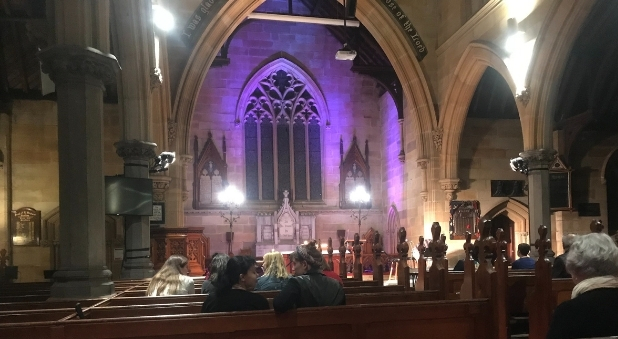Twice a year, Newtown and Erskineville Anglican Church hosts a service of remembrance and hope to comfort and encourage locals who have lost a loved one... but 2020 hasn’t been your average year.
Assistant minister the Rev Mike Hastie says the church team considered how it might alter this month’s event in light of the extra grief and loss caused by COVID, and the result will be a psalm-based service of lament.
“Our Christmas theme this year is ‘A weary world rejoices’, and we’re going to start that season of Christmas with the service of lament,” he says. “It doesn’t have to be a downer, it’s just appropriate – it’s flat-out appropriate – to acknowledge the need for lament, that it should be part of what we do, and even more so this year.
“We probably struggle to lament in general... it’s just not in the pattern of how we do life, and yet life contains things that we ought to lament because things aren’t the way they ought to be.”
The service will focus on Psalm 77, beginning with a cry to the Lord and praying through the many different things that have caused people grief this year (such as loss of work and connections, fear, illness and death). There will be specific times of lament, times of silence, petitioning and prayer through word and song, plus a reflection on our reason to hope.
“I want to create space to boldly lament before God, even expressing our frustration towards God like the psalmists often do.”
What particularly concerns Mr Hastie is that, once the pre-Christmas season begins in the community, the push will be for the focus to be on joy.
“Every shopping centre is going to be trying to recapture the joy of Christmas,” he says, “and there’s an emptiness to that which we didn’t want to be part of.” He adds that while Christmas is obviously a time of great hope and joy for people of faith, to rush straight to that without working through the difficult year that has passed seems hollow
“I want to create space to boldly lament before God, even expressing our frustration towards God like the psalmists often do. Raw expression is part of coming before our relational God.
“We’re even going to put the service of lament on our Christmas advertising. We really want to give it that prominence. We’ve had success in the past in writing articles in the local newspaper and I think this will be of particular interest... even just explaining what it means to come together for the purpose of lamenting, as that will be strange for some people.”
The church will take registrations for the service, asking each person who registers what they are lamenting and the specific things they would like to ask God for.
“We certainly want to help people acknowledge the particular things that have led them to come to this,” Mr Hastie says. “Usually at least half of the people who come to the service of remembrance and hope would be from the community – and those people don’t necessarily know Jesus – so it’s always an interesting thing to try and help them and show them hope, and acknowledge that they don’t have a Christian understanding of these things.
“I want [people] to feel ministered to. I want them to feel like God gets them in this, and that he’s with them in this and that he’s bigger than this. They are not alone, their pain is shared, God answers and he is mighty. All those things.”
Anyone interested in using the lament service can find it here.






















